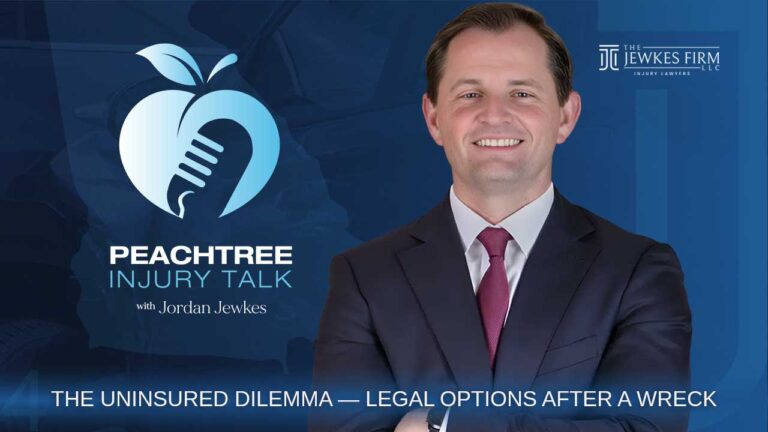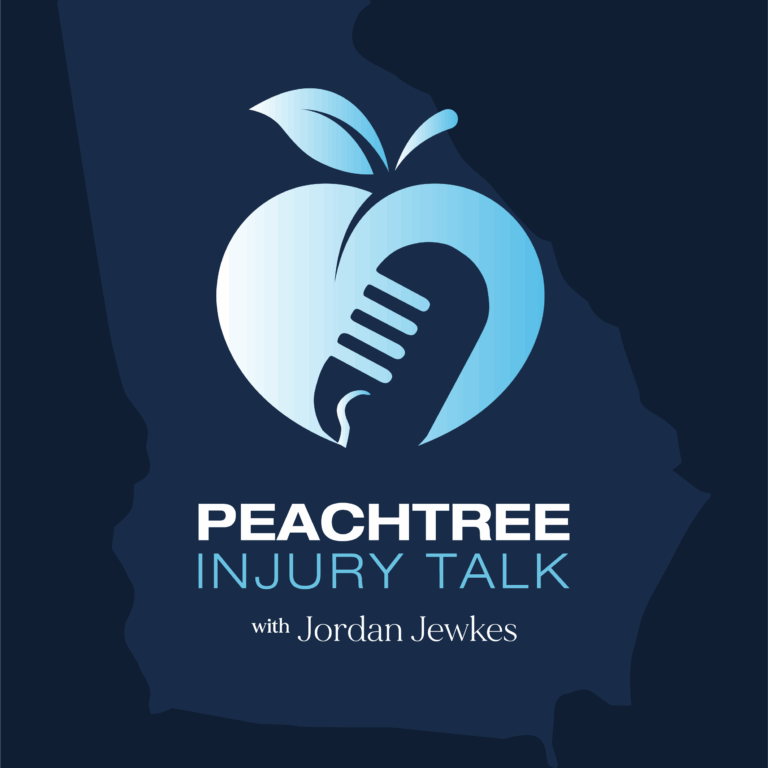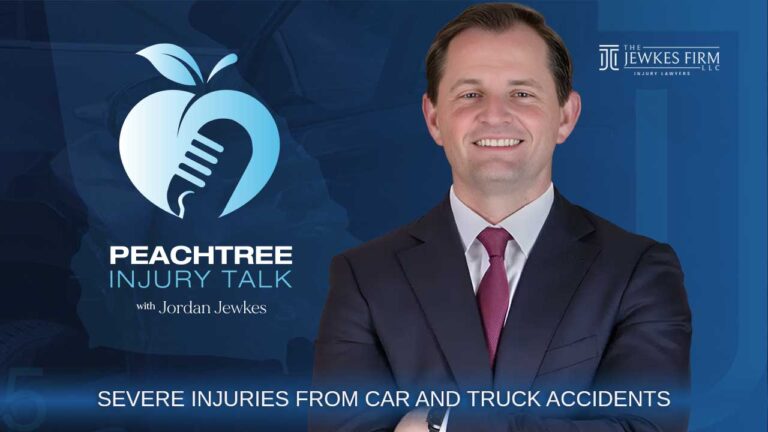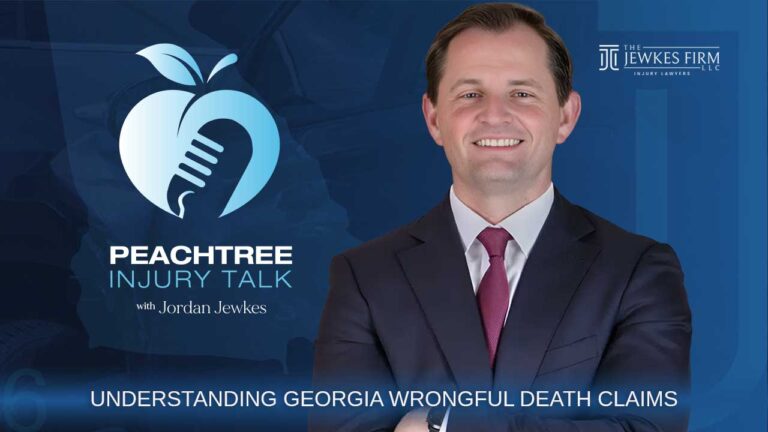
The Uninsured Dilemma — Legal Options After A Wreck
In this episode of Peachtree Injury Talk, attorney Jordan Jewkes discusses the critical topic of uninsured and underinsured motorists in Georgia. Jordan explains what uninsured
Home | Podcasts | Peachtree Injury Talk | Tort Reform Unpacked — What It Is, Why It Matters, and Who’s Impacted
Peachtree Injury Talk with Jordan Jewkes
In this episode of Peachtree Injury Talk, attorney Jordan Jewkes tackles the hot topic of tort reform in Georgia. What exactly is tort reform, and why does it matter to you? Jordan breaks down the basics, explaining how legislative changes could impact the rights of individuals seeking compensation for injuries. The discussion explores key players behind tort reform—including insurance companies, pharmaceutical companies, and large corporations—and how their influence shapes these laws. Jordan also sheds light on the McDonald’s hot coffee case, a landmark lawsuit often used to justify tort reform. The conversation then turns to real-world impacts, using Texas as a case study to determine whether tort reform has achieved its promised outcomes, such as lower insurance premiums.
Throughout the episode, Jordan shares his perspective on why tort reform often benefits large corporations at the expense of individual rights and access to fair compensation. The episode concludes with a discussion on the broader implications of these laws, particularly for marginalized communities and individuals who suffer life-changing injuries.
| 00:00 | Narrator: Welcome to Peachtree Injury Talk with attorney Jordan Jewkes. |
| 00:05 | Kevin Rosenquist: Hello and welcome to Peachtree Injury Talk with Jordan Jewkes. Jordan strives to give injured victims a voice and provide strong advocacy against an often broken system. I’m your host, Kevin Rosenquist, and today’s episode is all about a hot topic in Georgia—tort reform. Jordan, welcome back. It’s been a bit. |
| 00:25 | Jordan Jewkes: Hey, Kevin. Thank you for having me. Excited to talk about this today and excited to be here. |
| 00:30 | Kevin Rosenquist: Alright, I’m not going to lie—I don’t know what tort reform is. So could you tell me what it is and why it’s such a hot topic right now? |
| 00:37 | Jordan Jewkes: Kevin, you're not alone. Most people don’t know what tort reform is, so don’t feel bad. Tort reform is something you hear in the news a lot. Our governor here in Georgia is making a very vocal push for it. So I love the idea of talking about it and giving some facts and data—hopefully objectively. Obviously, I have some biases, but today we can hopefully explain what it is in a way the average listener can understand. Tort reform became popular in the late '90s and early 2000s. It tends to be a more conservative movement, where legislators, business owners, and insurance companies say, “Hey, we need to curtail runaway or nuclear verdicts from juries.” The idea is that by putting limits on lawsuits, especially so-called “frivolous lawsuits,” we’ll improve insurance rates and strengthen the business climate in the state. |
| 01:46 | Kevin Rosenquist: What kind of impact does that have on the average person? |
| 01:50 | Jordan Jewkes: Great question. Whether you’re for or against tort reform, the important thing is understanding how it could affect you as a citizen and taxpayer. Proponents claim tort reform will lower your insurance premiums—make your monthly car insurance cheaper—and improve the business environment by protecting companies from massive jury verdicts. You’ll hear phrases like, “Georgia’s become a judicial hellhole,” meaning that juries are handing out massive verdicts that hurt business. On the other hand, people who are injured through no fault of their own often rely on the court system as their only path to fair compensation. If tort reform is enacted, it could significantly limit your ability to recover damages through an insurance claim or a lawsuit. |
| 03:14 | Kevin Rosenquist: So is it basically insurance companies saying, “Hey, we’re not making enough money”? |
| 03:18 | Jordan Jewkes: In a way, yes. When you pull back the curtain on tort reform, there are generally three major players behind it: insurance companies, pharmaceutical companies, and big tobacco. You’ll also see broader corporate support, often through groups like the Chamber of Commerce. Insurance companies are at the forefront because they’re the ones who typically pay out when big jury verdicts come down. So they want laws in place that limit what they might have to pay. |
| 04:11 | Kevin Rosenquist: You mentioned “nuclear” or “runaway” verdicts earlier. Can you give a real-life example of that? |
| 04:18 | Jordan Jewkes: Sure. Probably the most famous example is the McDonald’s hot coffee case from Texas. A woman ordered coffee at a drive-thru, it spilled on her, and she suffered severe burns. The jury awarded her a multi-million dollar verdict. That case became the poster child for tort reform. People heard the headline—“Lady spills coffee and wins millions”—and thought it was ridiculous. But if you look closer, the burns were very serious, and the jury didn’t just compensate her for her injuries. They punished McDonald’s because it had prior knowledge that the coffee was dangerously hot and had received multiple complaints about it. The jurors later said they were sending a message to McDonald’s to change its practices. And even then, the judge reduced the award afterward. |
| 06:23 | Kevin Rosenquist: Are there states that have enacted tort reform? Has it worked? |
| 06:30 | Jordan Jewkes: Yes, Texas is a major example. They enacted tort reform in the early 2000s. Georgia actually passed its own version in 2005, putting caps on medical malpractice damages, but in 2010, the Georgia Supreme Court ruled that law unconstitutional. In Texas, we’ve seen what happens post-reform. Insurance premiums were supposed to drop—but the data shows they’ve continued to rise. So the central promise of tort reform—lower premiums—hasn’t really panned out. |
| 07:24 | Kevin Rosenquist: Not surprising. If they’re not paying out as much and premiums are still going up, that feels pretty telling. |
| 07:37 | Jordan Jewkes: Exactly. Insurance companies are for-profit entities. So if their costs go down, that doesn't mean your premium will. And only a small portion of their costs come from jury verdicts anyway. There are wildfires in California, hurricanes in Florida—these kinds of disasters affect insurance more than jury trials do. But jury trials are easier to blame. |
| 08:43 | Kevin Rosenquist: Who are the main opponents of tort reform? |
| 09:05 | Jordan Jewkes: Trial lawyers, for one—but more importantly, everyday citizens who have been injured. Most people don’t think much about the court system until they really need it. But once you’ve been hurt and try to get help, you realize how important it is to have access to a fair trial. Yes, we all want common-sense laws. But tipping the scales in favor of corporations and insurers at the expense of individual rights? That’s a slippery slope. |
| 12:40 | Kevin Rosenquist: Especially with the way wealth is concentrated these days. I can’t imagine many average folks would be in favor of it—unless they’re promised lower insurance premiums. |
| 12:48 | Jordan Jewkes: You’re right. The buzzwords—“lower insurance,” “judicial hellhole,” “frivolous lawsuits”—they’re persuasive. But when people actually dig into the details, they realize tort reform takes away more than it gives. That’s why, despite being discussed every year, Georgia hasn’t passed a new version of it. |
| 13:43 | Kevin Rosenquist: Yeah, you say “lower insurance” and people are going to listen. But if the data shows it doesn’t actually work... |
| 13:52 | Jordan Jewkes: Right. It's great political messaging. But again, Georgia doesn’t have a massive volume of multi-million dollar verdicts. And when those do happen, it’s usually because there’s been egregious behavior by the defendant or extreme injuries. One example—there was a young primary care doctor who had a heart procedure. The surgeon made an error that left him unable to work. He sued, but the state had a cap—he could only recover a million dollars, despite losing his entire career and future earnings. That’s the dark side of tort reform. It punishes severely injured people—especially young people or those with high future potential. |
| 14:16 | Kevin Rosenquist: Roughly what percentage of your cases actually go to trial? |
| 14:21 | Jordan Jewkes: Probably 2 to 3 percent. Most cases settle. |
| 14:51 | Kevin Rosenquist: And one argument for tort reform is that it would encourage more settlements. Does that hold up? |
| 14:54 | Jordan Jewkes: Not really. If you restrict a person’s right to trial, it actually makes insurance companies less likely to settle fairly. Why would they offer a reasonable settlement if they know you can’t get a fair hearing in court? So that argument kind of falls apart. |
| 14:59 | Kevin Rosenquist: Especially when 98% of cases are already settling. That point seems kind of weak. |
| 15:09 | Jordan Jewkes: Right. And again, the big verdicts we see in Georgia usually involve very serious injuries or really bad conduct by the defendant. Tort reform ends up hurting people who are already suffering, while the insurance companies continue making billions. It just doesn’t achieve what it promises. |
| 17:13 | Kevin Rosenquist: Yeah, especially since every case is different. A one-size-fits-all cap doesn’t really make sense. |
| 17:30 | Jordan Jewkes: Exactly. And to your point, $1 million isn’t what it used to be. For some, it’s more than enough. For others, especially someone who loses decades of income and quality of life, it falls far short. |
| 18:11 | Kevin Rosenquist: Well, fascinating topic. Thanks again for joining us on Peachtree Injury Talk with Jordan Jewkes. If you’d like to get in touch with Jordan and his team, visit jewkesfirm.com (http://jewkesfirm.com). Please like and subscribe to the channel and leave us a review if you can. Jordan, thanks for all the info—really interesting stuff. |
| 18:31 | Jordan Jewkes: Always a pleasure. Thanks, Kevin. |
| 18:33 | Narrator: Thanks for watching. Be sure to hit that like and subscribe button and leave us a review in the comments. |

Peachtree Injury Talk is a podcast by Kevin Rosenquist featuring legal insights and practical advice from Georgia-based attorney Jordan Jewkes. The show focuses on personal injury law, offering listeners expert guidance on navigating insurance claims, understanding legal processes, and protecting their rights after an accident. Each episode dives into real-life case examples, common challenges injured individuals face, and actionable tips for dealing with insurance companies and legal hurdles.
Episode Summary
In this episode of Peachtree Injury Talk, attorney Jordan Jewkes joins host Katie Roberts to break down the often-overlooked financial and emotional tolls of personal injury. From immediate and long-term medical expenses to lost wages and mental health challenges, Jordan explains how these hidden costs can significantly impact a victim’s recovery and financial future. He also shares insights into dealing with insurance companies, ensuring fair compensation, and navigating the complexities of personal injury claims.
Timestamps
00:00 – Welcome to Peachtree Injury Talk with Jordan Jewkes
00:05 – Episode introduction: The hidden costs of personal injury
00:31 – Medical expenses: Immediate vs. long-term costs
02:08 – The role of chiropractors vs. orthopedists in injury claims
03:34 – How insurance companies challenge medical treatments
05:16 – The insurance industry’s strategy to minimize payouts
06:06 – Addressing emotional strain and mental health challenges
07:22 – Future medical costs: How they impact settlements
08:46 – Advice for managing financial and emotional fallout after an injury
10:34 – Do insurance companies fairly compensate for emotional distress?
11:56 – Final thoughts and ensuring long-term financial security
12:16 – Closing remarks and where to find more information
About the Show
Peachtree Injury Talk is hosted by attorney Jordan Jewkes, who is dedicated to giving injury victims a voice and fighting for their rights against an often unfair system. Each episode provides valuable legal insights and practical advice for those navigating personal injury claims.

Tort Reform Unpacked — What It Is, Why It Matters, and Who’s Impacted breaks down the contentious issue of tort reform in Georgia. Tort reform, a topic often pushed by conservative groups, insurance companies, and businesses, aims to limit lawsuits, particularly those involving large jury verdicts, which proponents argue are too costly for businesses and insurers. They claim that tort reform can reduce insurance premiums and create a better business environment by curtailing “frivolous lawsuits.”
Jordan explains that tort reform gained traction in the late 1990s and early 2000s, and is largely supported by industries that face significant payouts in lawsuits, such as insurance companies, pharmaceutical companies, and big tobacco. These entities argue that the high costs associated with large jury awards drive up insurance premiums and hurt the business climate.
For the average person, the implications of tort reform are two-fold. Supporters claim that limiting lawsuits will lower car insurance premiums and prevent businesses from facing excessive financial penalties. Critics, however, argue that tort reform disproportionately harms injured individuals who rely on the court system for compensation. If lawmakers enact such reforms, victims of accidents or malpractice could struggle to recover full damages, especially in cases where severe or life-altering injuries occur.
A key example often cited by proponents of tort reform is the infamous McDonald’s hot coffee case, where a woman sued after suffering serious burns from spilled coffee. While the case became a symbol for “nuclear” verdicts, Jordan points out that the jury awarded damages not only for the injuries but also to send a message to McDonald’s for its known unsafe practices. Sensationalized headlines skewed the public perception of the case. However, the jury based their decision on a deeper understanding of the company’s responsibility.
States like Texas have enacted tort reform, but Jordan notes that the results have not lived up to the promises. Insurance premiums did not drop as expected after reforms were put in place, and in some cases, they even increased. This suggests that the central claim of tort reform—lower premiums for consumers—is not always realized, as the driving factors behind insurance costs are broader than jury verdicts.
The primary opposition to tort reform comes from trial lawyers and everyday citizens who believe that limiting legal recourse undermines the rights of individuals to seek fair compensation. Jordan argues that most people don’t consider the importance of the legal system until they themselves need it, at which point they realize the necessity of fair access to the courts. While proponents often present tort reform with promises of lower premiums, Jordan suggests that the actual consequences may end up hurting those who are already vulnerable, especially when legislators apply a one-size-fits-all cap to damages.
Lastly, Jordan highlights that tort reform might not even encourage more settlements, as supporters claim. By limiting access to trial, insurers are less incentivized to offer fair settlements, knowing that individuals may not have the means to challenge them in court. Given that only 2-3% of cases actually go to trial, the need for reform in this area is questionable.
In conclusion, Jordan argues that tort reform fails to address the real issues while harming those who most need the court system to uphold their rights. While corporate interests push for these reforms to limit payouts, the broader public may find that the promises of lower insurance rates and better business environments don’t materialize as expected. For more information, reach out to The Jewkes Law Firm at (770) 771-5130.
This show is designed to deliver general information regarding the law. Our guests will not provide tailored legal advice. If you have a personal issue and need legal support, get in touch with us for a free consultation with a Jewkes Firm attorney.
Subscribe to our newsletter for essential updates and expert legal advice.

In this episode of Peachtree Injury Talk, attorney Jordan Jewkes discusses the critical topic of uninsured and underinsured motorists in Georgia. Jordan explains what uninsured

In this episode of Peachtree Injury Talk, attorney Jordan Jewkes discusses severe injuries that result from car and truck accidents in Georgia. He highlights common

In this episode of Peachtree Injury Talk, attorney Jordan Jewkes breaks down wrongful death claims in Georgia, discussing situations such as car accidents, medical malpractice,